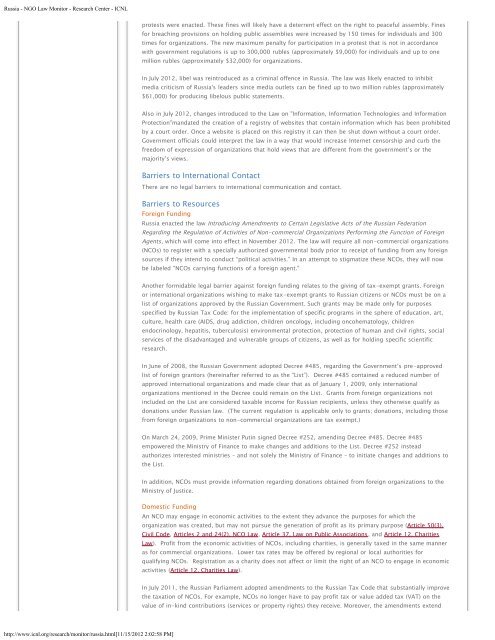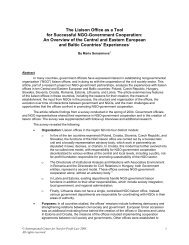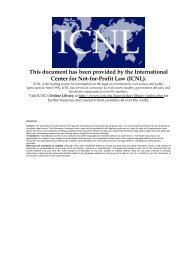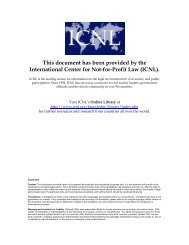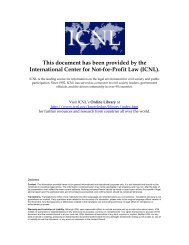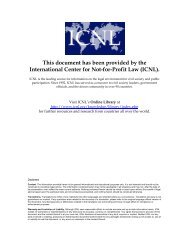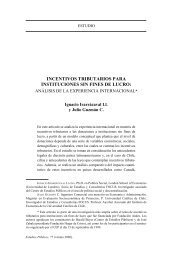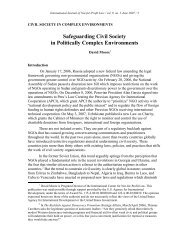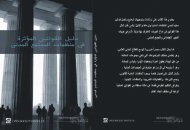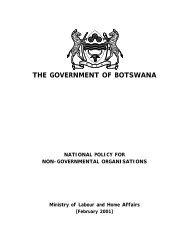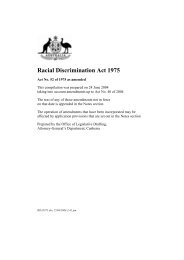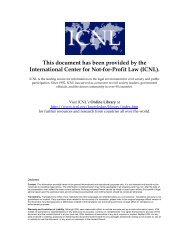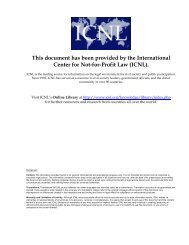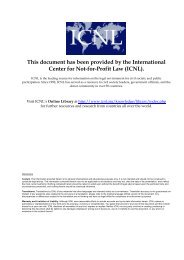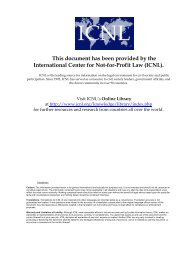Russia - NGO Law Monitor - Research Center - ICNL
Russia - NGO Law Monitor - Research Center - ICNL
Russia - NGO Law Monitor - Research Center - ICNL
You also want an ePaper? Increase the reach of your titles
YUMPU automatically turns print PDFs into web optimized ePapers that Google loves.
<strong>Russia</strong> - <strong>NGO</strong> <strong>Law</strong> <strong>Monitor</strong> - <strong>Research</strong> <strong>Center</strong> - <strong>ICNL</strong><br />
http://www.icnl.org/research/monitor/russia.html[11/15/2012 2:02:58 PM]<br />
protests were enacted. These fines will likely have a deterrent effect on the right to peaceful assembly. Fines<br />
for breaching provisions on holding public assemblies were increased by 150 times for individuals and 300<br />
times for organizations. The new maximum penalty for participation in a protest that is not in accordance<br />
with government regulations is up to 300,000 rubles (approximately $9,000) for individuals and up to one<br />
million rubles (approximately $32,000) for organizations.<br />
In July 2012, libel was reintroduced as a criminal offence in <strong>Russia</strong>. The law was likely enacted to inhibit<br />
media criticism of <strong>Russia</strong>'s leaders since media outlets can be fined up to two million rubles (approximately<br />
$61,000) for producing libelous public statements.<br />
Also in July 2012, changes introduced to the <strong>Law</strong> on "Information, Information Technologies and Information<br />
Protection"mandated the creation of a registry of websites that contain information which has been prohibited<br />
by a court order. Once a website is placed on this registry it can then be shut down without a court order.<br />
Government officials could interpret the law in a way that would increase Internet censorship and curb the<br />
freedom of expression of organizations that hold views that are different from the government’s or the<br />
majority’s views.<br />
Barriers to International Contact<br />
There are no legal barriers to international communication and contact.<br />
Barriers to Resources<br />
Foreign Funding<br />
<strong>Russia</strong> enacted the law Introducing Amendments to Certain Legislative Acts of the <strong>Russia</strong>n Federation<br />
Regarding the Regulation of Activities of Non-commercial Organizations Performing the Function of Foreign<br />
Agents, which will come into effect in November 2012. The law will require all non-commercial organizations<br />
(NCOs) to register with a specially authorized governmental body prior to receipt of funding from any foreign<br />
sources if they intend to conduct “political activities.” In an attempt to stigmatize these NCOs, they will now<br />
be labeled "NCOs carrying functions of a foreign agent."<br />
Another formidable legal barrier against foreign funding relates to the giving of tax-exempt grants. Foreign<br />
or international organizations wishing to make tax-exempt grants to <strong>Russia</strong>n citizens or NCOs must be on a<br />
list of organizations approved by the <strong>Russia</strong>n Government. Such grants may be made only for purposes<br />
specified by <strong>Russia</strong>n Tax Code: for the implementation of specific programs in the sphere of education, art,<br />
culture, health care (AIDS, drug addiction, children oncology, including oncohematology, children<br />
endocrinology, hepatitis, tuberculosis) environmental protection, protection of human and civil rights, social<br />
services of the disadvantaged and vulnerable groups of citizens, as well as for holding specific scientific<br />
research.<br />
In June of 2008, the <strong>Russia</strong>n Government adopted Decree #485, regarding the Government’s pre-approved<br />
list of foreign grantors (hereinafter referred to as the “List”). Decree #485 contained a reduced number of<br />
approved international organizations and made clear that as of January 1, 2009, only international<br />
organizations mentioned in the Decree could remain on the List. Grants from foreign organizations not<br />
included on the List are considered taxable income for <strong>Russia</strong>n recipients, unless they otherwise qualify as<br />
donations under <strong>Russia</strong>n law. (The current regulation is applicable only to grants; donations, including those<br />
from foreign organizations to non-commercial organizations are tax exempt.)<br />
On March 24, 2009, Prime Minister Putin signed Decree #252, amending Decree #485. Decree #485<br />
empowered the Ministry of Finance to make changes and additions to the List. Decree #252 instead<br />
authorizes interested ministries – and not solely the Ministry of Finance – to initiate changes and additions to<br />
the List.<br />
In addition, NCOs must provide information regarding donations obtained from foreign organizations to the<br />
Ministry of Justice.<br />
Domestic Funding<br />
An NCO may engage in economic activities to the extent they advance the purposes for which the<br />
organization was created, but may not pursue the generation of profit as its primary purpose (Article 50(3),<br />
Civil Code, Articles 2 and 24(2), NCO <strong>Law</strong>, Article 37, <strong>Law</strong> on Public Associations, and Article 12, Charities<br />
<strong>Law</strong>). Profit from the economic activities of NCOs, including charities, is generally taxed in the same manner<br />
as for commercial organizations. Lower tax rates may be offered by regional or local authorities for<br />
qualifying NCOs. Registration as a charity does not affect or limit the right of an NCO to engage in economic<br />
activities (Article 12, Charities <strong>Law</strong>).<br />
In July 2011, the <strong>Russia</strong>n Parliament adopted amendments to the <strong>Russia</strong>n Tax Code that substantially improve<br />
the taxation of NCOs. For example, NCOs no longer have to pay profit tax or value added tax (VAT) on the<br />
value of in-kind contributions (services or property rights) they receive. Moreover, the amendments extend


